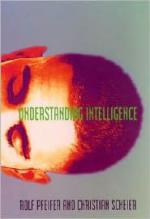
NEWS: Chatbots.org survey on 3000 US and UK consumers shows it is time for chatbot integration in customer service!read more..
Understanding Intelligence

Most artificial intelligence seems artificially dumb. Sure, Deep Blue can beat a chess grand master two games out of three, but could it get out of the way of an oncoming bus? AI researchers are coming to understand that if we want more than idiot savants for machines, we’ll need to build them from the ground up—a behavior-based approach. Rolf Pfeifer, head of the Artificial Intelligence Laboratory at the University of Zurich, and Christian Scheier, postdoctoral fellow at the University of Zurich and Caltech, have put together Understanding Intelligence, the definitive introduction to this approach for students, amateurs, and professionals alike. As they admit, there are plenty of gaps in our knowledge, so they take pains to make our ignorance as well as our knowledge explicit, and encourage thinking beyond the text with “Issues to Think About” at the end of each chapter.
Delving into neural networks, subsumption architecture, principles and design of intelligent systems, and future applications, the authors strive to exhaust the literature and compress it into concise, readable text with plenty of illustrations where appropriate. Given the freshness of the material, it feels less like a textbook and more like a treasure map—we don’t know what we’ll find when we get there, but we know it’s going to be good. Whether robotics is a career, a hobby, or a side interest for you, Understanding Intelligence will help you get to work from the bottom up.
The book provides a systematic introduction to the new way of thinking: the study of behavior-based intelligence, also known as embodied cognitive science, “new AI,” and “behavior-based AI.”. After discussing concepts and approaches such as subsumption architecture, Braitenberg vehicles, evolutionary robotics, artificial life, self-organization, and learning, the authors derive a set of principles and a coherent framework for the study of naturally and artificially intelligent systems, or autonomous agents. This framework is based on a synthetic methodology whose goal is understanding by designing and building.
New Comment
Only registered members are allowed to comment. or login
or login
